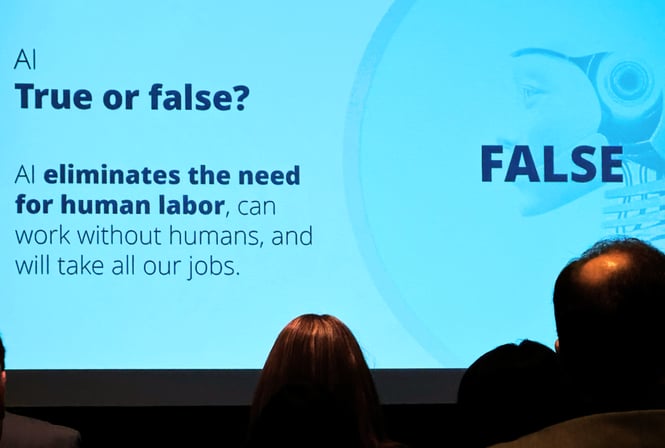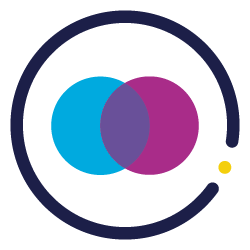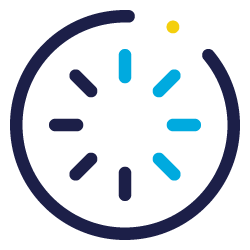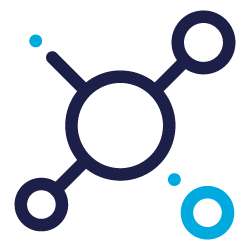-1.png?length=2880&name=MicrosoftTeams-image%20(24)-1.png)
-1.png?length=1000&name=MicrosoftTeams-image%20(24)-1.png)
“AI won't replace humans — but humans with AI will replace humans without AI.” – Karim Lakhani, Harvard Business School Professor
Earlier this year, I submitted a proposal to speak at Taxonomy Bootcamp, a conference that focuses on building and managing taxonomies (the classifications of terms for an organization). My proposal, Building Taxonomies: What a Difference Engagement Makes, was chosen for the taxonomy fundamentals track. I was excited both at the prospect of presenting as well as attending the conference since Taxonomy Bootcamp is co-located with four other conferences including KM World (knowledge management), Enterprise Search and Discovery, Enterprise AI World, and Text Analytics Forum. Most of the sessions I attended were from the Taxonomy Bootcamp and Enterprise AI World tracks, but I made it to sessions from each conference (Gotta get the most out of that Gold pass, right?).
Generative AI was this year’s guest of honor (or maybe I should say, elephant in the room), appearing throughout each of the conferences, not only Enterprise AI World! The message was consistent and clear: Generative AI will never be able to replace a human, but it will change the way we work. We have an opportunity to integrate and work with AI to help us be more productive and efficient.
AI has been around for decades, but Chat GPT and Generative AI have made a big splash recently.7 What’s so different about ChatGPT? It’s easy for anyone to use. Adoption-wise, it only took ChatGPT five days to get 1 million users, while it took Instagram 2 ½ months and Facebook 10 months.
Here’s where I learned AI Works Well:
- The rate of improvement in AI is exponential!
- Chat GPT’s Interface is user-friendly - Ease trumps accuracy with AI
- Consultants using AI tools produced higher-quality results and were faster and more productive
- Using AI can give below-average performers a boost, making them high-performers
- It’s a good start, like an assistant who can create your agendas or outlines
- Generating code and generating content from reference text
- Retrieval Augmented Generation (RAG) – Using generative AI that is trained on large language models (LLMs), but then incrementally trained on specific content to your organization, giving AI the context that it needs
- With governance applied to AI (policies, procedures, and curated unbiased data)

Here’s what I took away to watch out for:
- AI hallucinates, all the time, it just either hallucinates correctly or incorrectly. We might inadvertently trust the incorrect hallucinations because of trust we have put into it for correct answers
- AI has access to copyrighted works and intellectual property and could plagiarize and steal from them
- If you write something with AI, do we need to credit the AI? Yes, ethically we should credit the source
- Be wary of sharing data with Open AI, but there are commercial models that don’t share your data
- AI will lead to more fragmentation. It feeds on itself, leading to poorer quality
- Creators can use new software to make their images “poison”: Nightshade “gives creators the power to add invisible alterations to their artwork that’ll cause chaotic and unreliable results when used to train AI models”
- A gap in recent information—Generative AI is trained on historic information and things change quickly.
- If AI can write code, it can break code.
- People are speaking with ChatGPT for hours (like the 2013 Spike Jonze movie Her)
- “AI systems can perpetuate and even amplify societal biases, leading to unfair treatment of certain groups of people”
- AI isn’t good at the unpredictable (absence of patterns): Self-driving cars have 200% more accidents (they can’t handle sudden lane changes)
- AI needs context, so many words and groups of words have multiple meanings, but context can also come from our taxonomies that AI understands
- What happens if we were to lose power for a long time? AI is great, but it might not be there for us in disasters
AI is not coming for our jobs, but it is coming for our projects and our personal lives. Humans need to be at the center of AI, as this human/machine combo will help us organize and enhance our content and imagery better and more efficiently than ever. Right now, Chat GPT (Generative Pre-Trained) is at the level of intern/assistant, but it will evolve to be a higher level at its rate of improvement. Still, we can’t depend on it always being there and need to keep our human skills sharp! Some elite schools are even removing technology completely from the classroom. I told my 13-year-old niece this and her response was, “I am not going to those schools,” but her mother/my sister, a Spanish Language Professor at Berry College, loved the idea of removing technology from the classroom. She only gives her students in-person writing assignments so that they can’t cheat with AI. My sister’s classroom aside, there is a place for AI in society, and especially in content operations, with us humans at the center, making sure the machines don’t run amok.
Mary Katherine Barnes, Operations Lead
Sources
(1) Machine Learning is Coming for Taxonomies, Rachael Maddison, Product Manager, Taxonomy 7 Core Tech, Adobe
(2) The Knowledge Foundation: Take GPT from Transformer to Transformation, Ashu Roy, Chairman & Chief Executive Officer, eGain
(3) Why AI Isn’t Coming For Your Job, Daniel W. Rasmus, Founder & Principal Analyst, Serious Insights University of Washington
(4) AI Ethics for the Enterprise, Dr. Anthony J. Rhem, CEO/Principal Consultant – A. J. Rehm & Associates, Author, Knowledge Management in Practice | Essential Topics in Artificial Intelligence
(5) Generative AI, Context, and Knowledge Models, Heather Hedden, Knowledge Manager, Semantic Web Company, Author of The Accidental Taxonomist
(6) ChatGPT, Taxonomist: Opportunities & Challenges in AI-Assisted Taxonomy Development, Marjorie Hlava, President - Access Innovations Data Harmony; Heather Kotula, VP, Marketing and Communications - Access Innovations, Inc.; Dr. Xia Lin, Professor - Drexel University
(7) Generative AI and the Impact on Search, Kamran Khan, CEO Pure Insights
(8) Guardians of Truth in the Enterprise, Gabriel Karawani, Co-Founder - ClearPeople
(9) Machine Learning & AI for the Enterprise, Professor Dave Snowden, Chief Science Officer, The Cynefin Co
(10) Generative AI for the Enterprise, Seth Earley, Founder & CEO - Earley Information Science, Author of The AI-Powered Enterprise: Harness the Power of Ontologies to Make Your Business Smarter, Faster and More Profitable

.png?length=800&name=Untitled-4-CrOps%20Maturity%20Assessment%20landing%20page%20graphic%20(1).png)


%E2%80%8B-%E2%80%8B%20%E2%80%8B.png?length=256&name=Purple%20B__Align%20(Content%20Alignment)%E2%80%8B-%E2%80%8B%20%E2%80%8B.png)
%E2%80%8B-%E2%80%8B%20%E2%80%8B-1.png?length=256&name=__Align%20(Content%20Alignment)%E2%80%8B-%E2%80%8B%20%E2%80%8B-1.png)
%E2%80%8B%20%E2%80%8B.png?length=256&name=Blue%20B__Implement-%20(Technology%20Implementation)%E2%80%8B%20%E2%80%8B.png)
%E2%80%8B%20%E2%80%8B.png?length=256&name=__Implement-%20(Technology%20Implementation)%E2%80%8B%20%E2%80%8B.png)
%E2%80%8B.png?length=256&name=Blue%20B__Adopt-%20(Technology%20Adoption)%E2%80%8B.png)
%E2%80%8B.png?length=256&name=__Adopt-%20(Technology%20Adoption)%E2%80%8B.png)





%E2%80%8B-%E2%80%8B%20%E2%80%8B.png?length=256&name=__Align%20(Content%20Alignment)%E2%80%8B-%E2%80%8B%20%E2%80%8B.png)





%E2%80%8B-%E2%80%8B%20%E2%80%8B.png?length=256&name=Blue%20B__Align%20(Content%20Alignment)%E2%80%8B-%E2%80%8B%20%E2%80%8B.png)
%E2%80%8B%20%E2%80%8B.png?length=256&name=Cyan%20B__Implement-%20(Technology%20Implementation)%E2%80%8B%20%E2%80%8B.png)
.png?length=256&name=Blue%20B__Activate%20(Content%20Activation).png)
.png?length=256&name=__Activate%20(Content%20Activation).png)

.png?length=256&name=Data_%20Outcome_White%20BG%20(1).png)










